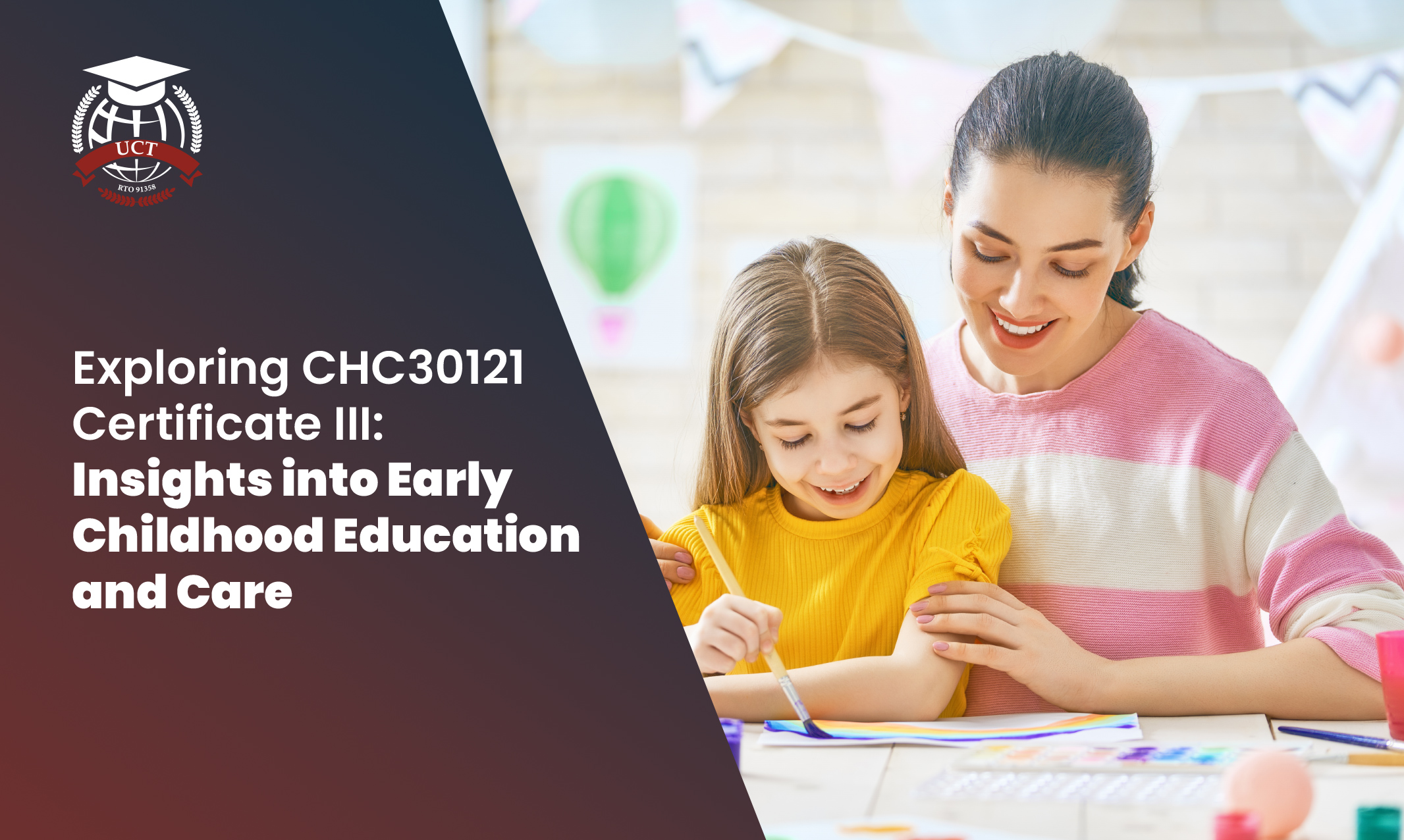Exploring CHC30121 Certificate III: Insights into Early Childhood Education and Care

Nurturing Early Childhood Education Development
Introduction:
The CHC30121 Certificate III in Early Childhood Education and Care offers a comprehensive foundation for individuals seeking to embark on a rewarding career nurturing young minds. In this article, we delve into the multifaceted aspects of early childhood education, exploring key concepts such as child development, play-based learning, and effective communication strategies. Through a holistic lens, we unravel the intricacies of CHC30121, shedding light on its significance in shaping the future of our youngest learners.
Understanding Child Development:
Child development forms the cornerstone of early childhood education, encompassing the physical, cognitive, social, and emotional growth of young children. CHC30121 equips educators with a deep understanding of developmental milestones, enabling them to tailor learning experiences that foster optimal growth and learning outcomes. From supporting fine motor skills through art activities to nurturing social-emotional competence through peer interactions, educators play a pivotal role in laying the foundation for lifelong learning.
Learning Through Play:
Play is the language of childhood, serving as a vehicle for exploration, imagination, and discovery. CHC30121 emphasizes the value of play-based learning, recognizing it as a powerful tool for cognitive growth and creativity. Through open-ended activities, such as building blocks or dramatic play, educators can scaffold learning experiences that stimulate critical thinking, problem-solving, and language development. By harnessing the innate curiosity of children, play becomes a vehicle for holistic education, nurturing their innate talents and interests.
Fostering cognitive growth:
Cognitive growth encompasses the development of thinking, reasoning, and problem-solving skills essential for academic success. CHC30121 provides educators with strategies to scaffold cognitive development through intentional learning experiences. From sequencing activities to spatial reasoning games, educators can engage children in activities that promote mathematical and scientific inquiry, laying a solid foundation for future academic pursuits. By fostering a love for learning and inquiry, educators empower children to become lifelong learners and critical thinkers.
Nurturing social-emotional skills:
Social-emotional skills are essential for navigating relationships, managing emotions, and developing empathy. CHC30121 emphasizes the importance of nurturing these skills through positive relationships and supportive environments. By modeling empathy, active listening, and conflict resolution strategies, educators create a safe and inclusive space where children feel valued and respected. Through group activities, such as collaborative projects or peer mediation sessions, children learn to communicate effectively, resolve conflicts peacefully, and develop a sense of belonging within their community.
Ensuring Child Protection and Safety:
Child protection and safety are paramount in early childhood settings, requiring educators to uphold rigorous standards of duty of care and risk assessment. CHC30121 equips educators with the knowledge and skills to create safe, nurturing environments that prioritize the well-being of children. From implementing stringent hygiene practices to conducting thorough risk assessments of play areas, educators ensure that children can explore and learn in environments free from harm. By adhering to strict safety procedures and protocols, educators uphold their duty of care and provide parents with peace of mind.
Curriculum planning and learning outcomes:
Curriculum planning lies at the heart of CHC30121, guiding educators in designing purposeful learning experiences that align with learning outcomes. By considering children’s interests, strengths, and developmental needs, educators can create flexible, responsive curricula that promote holistic development. Through ongoing observation and assessment, educators monitor children’s progress, identify areas for growth, and adapt their teaching strategies accordingly. By setting clear learning goals and objectives, educators empower children to reach their full potential and achieve meaningful learning outcomes.
Embracing Holistic Education:
Holistic education encompasses the development of the whole child, nurturing their intellectual, emotional, social, and physical well-being. CHC30121 adopts a holistic approach to early childhood education, recognizing the interconnectedness of these domains. By integrating art, music, movement, and nature into the curriculum, educators provide children with diverse opportunities for self-expression, creativity, and sensory exploration. Through holistic education, children develop a deep appreciation for the world around them, fostering a lifelong love of learning and inquiry.
Effective Communication Strategies:
Effective communication lies at the heart of successful early childhood education, facilitating meaningful interactions between educators, children, and families. CHC30121 equips educators with communication strategies that promote collaboration, partnership, and mutual respect. By maintaining open lines of communication with parents and caregivers, educators build trusting relationships that support children’s learning and development. Through regular updates, newsletters, and parent-teacher conferences, educators keep families informed and engaged in their child’s educational journey.
Promoting Parent Partnerships:
Parent partnerships are integral to the success of early childhood education programs, fostering a collaborative approach to supporting children’s learning and development. CHC30121 emphasizes the importance of building strong relationships with families, recognizing them as valuable partners in the educational process. By involving parents in decision-making, sharing children’s progress, and soliciting feedback, educators create a sense of ownership and investment in their child’s education. Through regular communication and community events, educators bridge the gap between home and school, creating a supportive network that nurtures children’s growth and well-being.
Fostering Team Collaboration:
Team collaboration is essential in early childhood settings, promoting shared goals, effective problem-solving, and professional growth. CHC30121 emphasizes the value of collaborative teamwork among educators, recognizing that each member brings unique perspectives and strengths to the table. By fostering a culture of trust, respect, and open communication, educators can work synergistically to create dynamic learning environments that meet the diverse needs of children. Through regular team meetings, professional development opportunities, and reflective practices, educators collaborate to continuously improve their practice and enhance learning outcomes for all children.
Resolving Conflicts Peacefully:
Conflict resolution skills are essential for fostering positive relationships, managing disagreements, and promoting a sense of community within early childhood settings. CHC30121 equips educators with strategies to facilitate peaceful resolution of conflicts among children, promoting empathy, communication, and problem-solving skills. By modeling respectful communication, active listening, and negotiation techniques, educators empower children to resolve conflicts independently and constructively. Through role-playing exercises, storytelling, and social-emotional learning activities, educators provide children with tools and strategies to navigate conflicts effectively, fostering a culture of empathy, understanding, and mutual respect.
Investing in Professional Development:
Professional development is key to staying abreast of best practices, emerging trends, and pedagogical innovations in early childhood education. CHC30121 encourages educators to pursue ongoing learning opportunities that enhance their knowledge, skills, and effectiveness in the classroom. From attending workshops and conferences to participating in online courses and peer mentoring programs, educators engage in continuous professional development to refine their practice and promote career advancement. By investing in their own growth and learning, educators inspire children to become lifelong learners and agents of change in their communities.
Embracing pedagogical practices:
Pedagogical practices encompass the methods, approaches, and philosophies that guide teaching and learning in early childhood settings. CHC30121 introduces educators to a range of pedagogical frameworks, including Montessori, Reggio Emilia, and Waldorf, that emphasize child-centered, holistic approaches to education. By incorporating elements of these philosophies into their practice, educators create dynamic learning environments that honor children’s autonomy, creativity, and curiosity. Through observation, reflection, and experimentation, educators refine their pedagogical practices to meet the evolving needs of children and families.
Continuing Education and Career Advancement:
Continuing education is essential for maintaining professional competence, expanding career opportunities, and staying current with industry standards in early childhood education. CHC30121 encourages educators to pursue further study and specialization in areas such as special education, child psychology, and early intervention. By obtaining additional qualifications and certifications, educators can enhance their expertise, advance their careers, and make meaningful contributions to the field of early childhood education. Through lifelong learning and professional development, educators inspire a culture of excellence and innovation that benefits children, families, and communities alike.
Conclusion:
In conclusion, CHC30121 Certificate III in Early Childhood Education and Care offers a comprehensive framework for nurturing the holistic development of young children and fostering a lifelong love of learning. Through a rich tapestry of play-based learning, effective communication strategies, and collaborative partnerships, educators create dynamic learning environments that empower children to thrive academically, socially, and emotionally. By embracing the principles of child development, safety procedures, and professional development, educators play a pivotal role in shaping the future of our youngest learners and building strong foundations for lifelong success. As we continue to explore the ever-evolving landscape of early childhood education, CHC30121 remains a beacon of excellence, guiding educators on a transformative journey of growth, discovery, and fulfillment.

